German as a foreign language
Our ConceptDue to the ever decreasing number of native speaking children and the increase of children with previous knowledge of different languages, we have revised and adapted our language concept several times with an increased focus on German.
Elementary Level: Kindergarten and Preschool
In general, we apply the immersion method (language bath) in our bilingual facility (German/Arabic) in the elementary area. According to the principle “one person – one language”, the respective educator speaks only in her native language with the children, supported by facial expressions, gestures or pointing. To reinforce this method, we have also set up language rooms in which the children are temporarily surrounded exclusively by the respective language (German or Arabic) in small groups. An individualized schedule based on the children’s language requirements and level of proficiency ensures optimal support and encouragement for the child. In terms of content, we develop basic elementary themes within the framework of a monthly plan, which are supplemented by situation-oriented themes and projects and the interests of the children. Songs, finger plays, books, stories and creative activities are selected and coordinated to match the theme, ensuring constant linguistic repetition of vocabulary. This is supplemented by corresponding word fields/picture cards, which are practiced playfully with the children.
Language and reading circle
In addition, a daily language circle takes place in our facility, in which the children talk about their preferences and practice simple sentence structures. In addition, there is a daily “reading circle” in the preschool, which takes place bilingually once a week.
In addition, our preschool children take part in the “Würzburg Training Program” (listening, hearing, learning) and “Numberland” (development of the number range 1 – 10), which last several weeks.
The children’s language development is documented using age-appropriate observation sheets that build on each other (Liseb 1 and 2, Sismik, Perik). This language level analysis is discussed with the parents twice a year in a development meeting.
The goal of our pedagogical work in language support is playful and holistic learning. The children are accompanied and individually supported in their language learning process. In addition to targeted language support, everyday speech with many language opportunities for the children is very important to us.
Preparation for elementary school
In order to make it easier for the children to settle into elementary school and also to prepare the parents for the upcoming change, certain elements are taken over from the elementary area in 1st grade, such as the visit of the children from preschool 2 to the school children or the joint school cone making with the preschool parents.
This transition concept was also extended in the school year 2021/22 by several projects such as:
- Use of the same picture card material (Kikus) in kindergarten/preschool and grade 1;
- Joint farewell party from the kindergarten/preschool years of Preschool 2 and Class 1;
- Continuation of the reading mentorships;
- Overlapping book/smartboard project “Tatu, the little elephant”;
- Reciprocal classroom visits by preschool and grade 1 teachers;
- Visits/observations in preschool 2 by the elementary school director and DaF coordinator
- Information session for parents from preschool 2 by the elementary school administration.
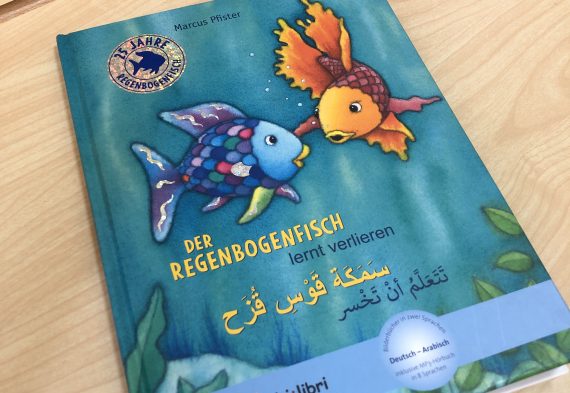
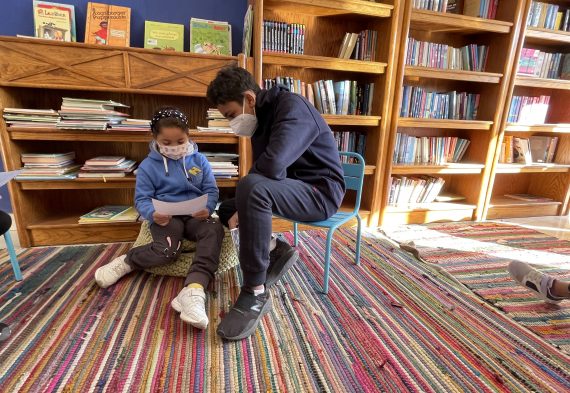
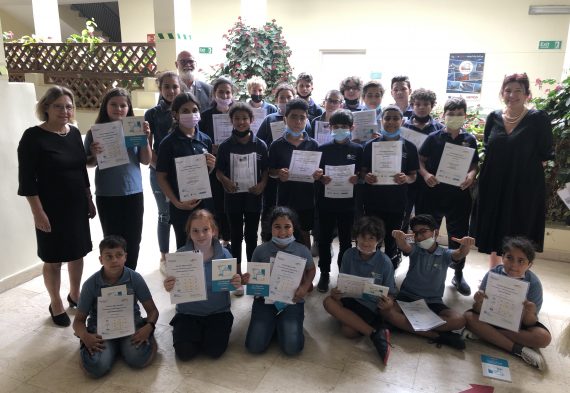
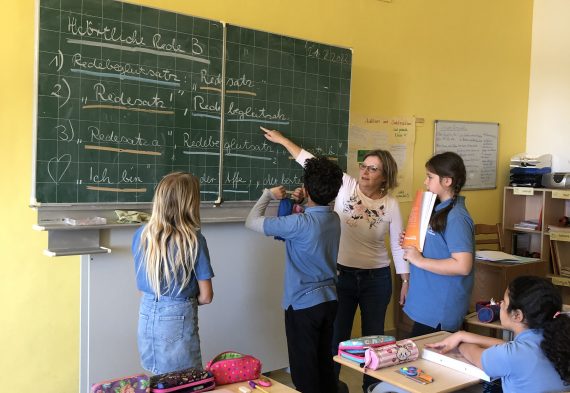
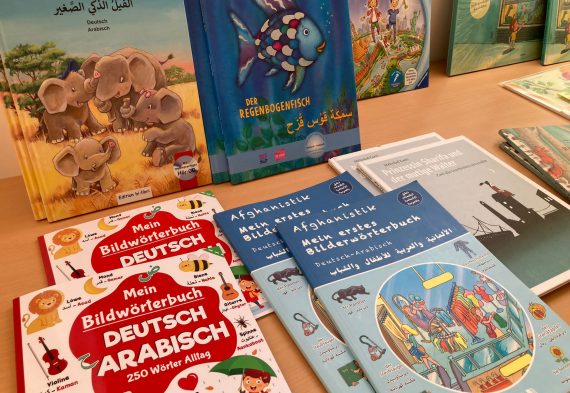
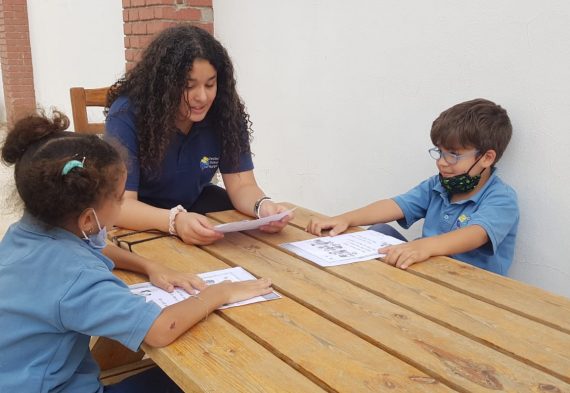
Primary level: Elementary school
According to the principle that “every lesson is a language lesson”, the promotion of children’s language skills must be the concern of all teachers assigned to each grade level. In most cases, this cannot be accomplished in regular German lessons alone, but must involve additional targeted and systematic promotion of the German language.
For this reason, the children in grades 1 to 4 receive targeted language instruction in German as a foreign language every day in class, but also differentiated according to language level. In order to be able to consistently maintain the linguistic example of children with German as their mother tongue, the aim is not to teach the special needs children in specially set up DaF classes, but to support them within the class group.
Since German language skills are also taught in subject lessons (DFU), e.g. in HSU, music or mathematics, already in elementary school, the “vocabulary folder” was introduced at DSH at the beginning of 2021/22, starting in 1st grade. In it, the obligatory subject vocabulary of all subjects, but also the situational vocabulary of German lessons, is collected, organized by subject. The “vocabulary folder” accompanies the children from 1st to 10th grade.
At the beginning of the 2021/22 school year, the elementary school board decided on numerous measures to promote language learning in the elementary school and summarized them in a concept. In addition to working with the “Vocabulary Folder”, competence tests for language level analysis such as “Stumbling Words Test” and “On the Way to DSD 1 are carried out. The German comparative work determines the competencies in mathematics in the 3rd grade. The “Sismik” program of the elementary level is now continued by the “Selsa” observation sheets. All of these measures are designed to identify specific needs for support. They are supplemented, for example, by going to the student library, adapting textbooks with additional support materials in the DaF area, or by digital support programs such as “Anton” or “Antolin”.
Preparation for secondary school:
Especially at the end of 4th grade, various tests are written to assess the language level. They are intended to show parents, teachers and students in which linguistic areas there is still a need for support in order to be able to start well in the 5th grade. Some of the elementary school measures, such as the “vocabulary folder” and going to the student library, are continued in the lower secondary classes.
A special transition concept was also drafted at the beginning of 2021/22.
Secondary: Lower & Higher Secondary School
In grades 5-7, children receive 6-7 hours of German per week, with at least one to two hours focused more on vocabulary and grammar and containing DaF elements. There is an independent curriculum for the subject DaF, which is used individually by the colleagues depending on the performance level of the group.
In addition, an independent DaF textbook will be introduced starting in the school year 202/23 in order to do justice to the increasing proportion of DaF learners in the classes. These textbooks will offer a mandatory vocabulary in German, tests, many language opportunities and digital, playful practice options. Furthermore, knowledge of German is taught via German in the subject lessons (DFU) in language-sensitive lessons in all subjects with the help of the “vocabulary folder”. This is because the principle of “every lesson is a German lesson” continues to apply. Here, too, the focus is on the acquisition of language skills.
In grades 11 and 12, the subject German is offered as “Language A”, i.e. at native language level, as part of the GIB. All other subjects that are part of the GIB and not a foreign language are also taught in German. The students in these grades have usually reached such a high level of German that additional language support – if the need exists – is offered individually by the teacher. In these grades, language support is of course still provided within the framework of language-sensitive teaching, especially in the learning of technical terms, but the focus is on teaching the content of the lessons.
